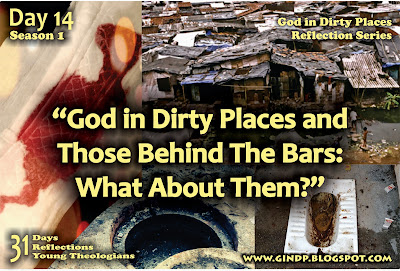Reflecting Verse: “The spirit of my Lord Yahweh is on me because Yahweh has anointed me….to proclaim liberty to captives and an opening to those imprisoned.”
Isaiah 61: 1
Lockdown is making us to experience how it is to be isolated,
captive behind one’s own door with activities limited, future unsure, and our hope
and anxiety on a seesaw. And yet, these for us, we are experiencing it for over two months, under the security of our homes, most of us with our loved ones. What
about them? Those in “dirty places”- Those behind bars- the prisons, caged
within walls of one’s own and others, shunned, the "most wanted" now "unwanted",
stigmatized beyond the bars and walls.
The Supreme Court termed some prisoners in India as
“unfortunate forgotten specimens of humanity.” This has proven true, yet again,
in the crisis of the pandemic. BBC News report dated 11th
May 2020, the prisons around the world have emerged as the hot spots of COVID-19
infection. Indian prisons appear to be of no exception as, overcrowding and
lack of proper hygiene are the norms of Indian prison. Besides, most sub-jails
lack properly trained doctors, let alone doctors who would treat COVID-19
patients. Inside the prison, anxiety and isolation are affecting the prisoners
as one of the reasons is that relatives no longer are able to visit them. These visits are important as they looked forward to it and it brought them
hope. In order to reduce overcrowding
and prevent the spread of COVID-19, in the crowded Indian Prisons, the Supreme
Court had asked states to free inmates on “interim bail” and “emergency
parole”. However, most of the prisoners
who are freed, due to the lockdown, are stranded, unable to return home. 77 of
2,600 prisoners and 26 prison officials at Mumbai’s Arthur road, as per the
news at the time of writing this article, were tested positive for COVID-19
putting in risk the other inmates in close quarters. Meanwhile, those who are
and would be released as per the criteria of the Supreme Court are still at
risk, now the task lies on the society.
In the verse above, we see the liberating work of God in action, demonstrating deep concern for people from all walks of life, even for those in
“dirty places” like the prisons. Jesus himself at the beginning of his ministry
quotes from this passage, as according to Gospel according to Luke 4:18
emphasizing the importance of the task. The anointed by God’s spirit is
figuratively for a commission for a specific task, for the freedom which God is
providing through God’s chosen instrument. It requires commitment to do God’s
will, a commitment to be present as an agent of God’s mercy to the broken and
imprisoned. This message, of comfort, freedom and support, is to be clearly
proclaimed and carried out for those imprisoned. As Jerusalem’s restoration
required more than mortar and sand, or the efforts of only the rulers, the power to restore is not limited only to the rulers of our times nor
just infrastructural developments, but it is passed on to the community as a
whole, enabling all members to join in this task of restoration, comfort and
hope of everyone even those in “dirty places” like prisons.
The lockdown’s discomfort and inconvenience incite us to empathize with those behind bars and to question ourselves, what about them? As God’s people,
chosen instruments and anointed by God’s spirit, is the message in the book of
Isaiah telling us loud and clear of our mandate? Then, for those in the “dirty
places” “forgotten”, what are the messages we have spoken and enacted to/for
them especially during this pandemic? Batches of those behind bars are/will be released;
the buck is passed on to the society, to us, to the church. “What about them?”
Prayer:
Spirit of God, move in us and stir us up, so that we may overflow
with your love, hope and comfort for those who are imprisoned and are/will be
released. Harness those who are stirred that in what we can and in our unity
your power for restoration would be manifested. Amen.
**********
Author: S. Esther Ao
About the Author: Esther hails from Dimapur belonging to the Dimapur Ao Baptist Church (DABA), Dimapur, Nagaland. She earned her Bachelor of Divinity from Bishop’s College, Kolkata, affiliated to the Senate of Serampore College and her Master of Theology in Biblical Studies (Old Testament) from the United Theological College, Bangalore. She was the member of Faculty of Calcutta Bible College, Kolkata. She is currently preparing for her Doctoral research Programme. Her interests are reading, music, creative writings and so on.
